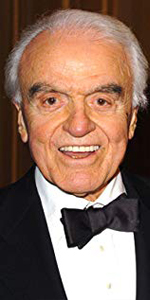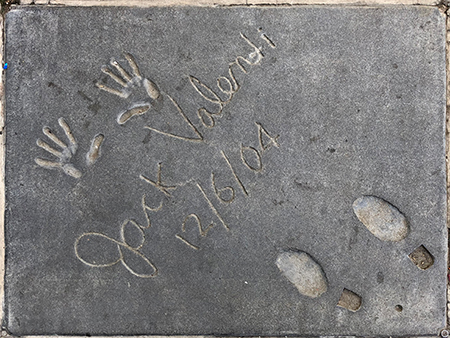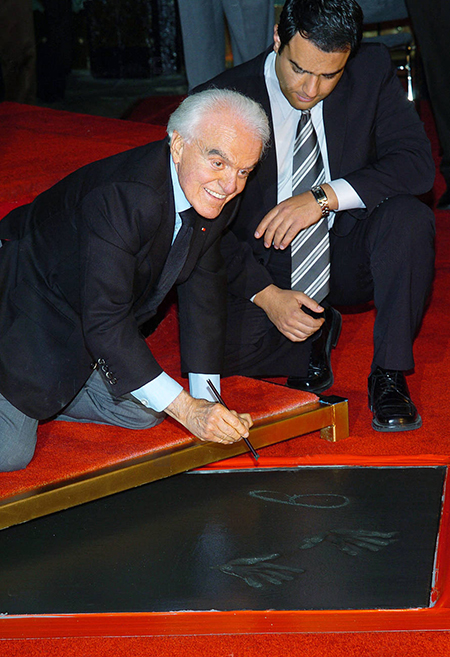 |
 |
 |
 |
 |
| Jack Valenti. Date unknown. |
| |
|
 |
| |
 |
| |
 |
| |
 |
| |
 |
| |
 |
| |
|
|
| Jack Valenti |
 |
| Forecourt Ceremony held on Monday, December 6, 2004 |
| |
Born: September 5, 1921, in Houston, Texas
Age at the time of the ceremony: 83
Died: April 26, 2006, in Washington, D.C., aged 85
|
| |
For many years, Jack Valenti was the face of the American Film Industry. Selected to run the Motion Picture Association of America at a time when production was going in a racier direction, Valenti created the MPAA's Classification and Ratings Administration, which issues those famous "this film has been rated ________" things.
Born to Italian immagrants, Jack's father was a clerk at the Harris County Courthouse, where the young lad soaked up the political atmosphere. Valenti campaigned for office of both his elementary and his high school, where he became a star debater. At the age of 15, he became an office boy at Humble Oil Company (later to become Exxon Mobile).
The wildly patriotic Valenti joined the United States Air Force at the start of World War II. Rising to the rank of first lieutenant, Valenti flew 51 combat missions over Europe, earning the Distinguished Flying Cross and the Air Medal.
At 25, Valenti graduated with a BBA from the University of Houston. While there, he worked on the staff of The Daily Cougar, and would serve as student president. Valenti got a MBA from Harvard University in 1948. Returning to Houston and Humble Oil, Valenti went to work in the company's advertising department, developing a "cleanest restrooms" campaign for the gasoline retailer, which greatly increased sales.
In 1952, Valenti partnered with Weldon Weekley to open the Weekley & Valenti advertising agency, with their first client being the Conoco oil company. By 1956, Valenti had met Senate Majority Leader Lyndon B. Johnson; the firm got into political consulting and marketing. The Weekley & Valenti agency worked on the Kennedy-Johnson presidential campaign in 1960. In 1962, Valenti married Johnson's personal secretary, Mary Margaret Wiley. They remained married until Jack's death.
As press liason in Dallas in November, 1963, Valenti was in the presidential motorcade when president Kennedy was assassinated. He was on Air Force One when vice-president Johnson was sworn into the office of president, and remained with Johnson at the White House for the first two months of Johnson's tenure. In 1964, Johnson gave Valenti the task of handling his Republican opponents in Congress. Johnson treated Valenti badly, giving people the impression that Valenti was a sycophant — but Valenti took it, and admired Johnson the rest of his life.
Valenti might just have spent the rest of his days working for elected officials if it hadn't been for Universal president Lew Wasserman's offer to become the head of The Motion Picture Association of America in 1966. Wasserman's MCA was having trouble with the Department of Justice; having Valenti as industry cheerleader seemed like a perfect fit.
Part of the political problem for Hollywood during this time was that filmmakers — big name filmmakers as well as stars — big stars — were making increasingly florrid films containing (mostly talk about) sex, and violent content. The old problem of how to give the screen the freedom it needed without bringing about legal censorship on a national or (God forbid) state-by-state basis
was key.
The solution arrived in 1968, when Valenti and MPAA lawyer Louis Nizer introduced the film rating system. This system has become so ubiquitous in the world of film exhibition that it hardly needs recounting here, but suffice it to say that, by rating films on the level of spicy content one could expect, audiences everywhere gained a reasonably reliable guide to what might be appropriate for their viewing habits and desires.
Valenti was a tireless advocate for the rating system, appearing on a ton of television programs to explain it and its benefits: The Academy Awards (where he was a frequent presenter), Dick Cavett, Today, David Frost, Mike Douglas, The Tonight Show — you name it.
Valenti's style during this time is best revealed when Nell Minow, a film reviewer for Common Sense Media, testified during a Congressional hearing that she thought the MPAA's rating system didn't do a good job of explaining films to families. When she finished, Valenti got up from his chair, went over to her, kissed her on the top of her head and said, "Nell, that's why we all need your website, because you can give parents what we can't." This was Valenti at his best: You get what you want, and we get what we want, and everyone's happy.
The MPAA, and by extension, Valenti, opposed Sony's developmenrt of the home video recorder, citing copyright issues, but once the Supreme Court cleared the way for home video recording, the studios jumped on the bandwagon. In 2003, Valenti told the major studios that they had to stop sending out "screeners" to potential award voters, as they were being sold on the black market. An injunction brought by a small production company forced Valenti to back down.
Jack Valenti resigned the presidency of the MPAA in 2004. He then became a venture capitalist, looking for media invenstment opportunities. In addition to being a founding member of the National Italian American Association, Valenti has been president of the Friends of the Global Fight Against AIDS, Tuberculosis and Malaria, and was president of the organization at the time of his death from the complications of a stroke at the age of 85, in Washington DC. He is buried in Arlington National Cemetery. |
|
|
|
|
| |
 |
 |
| Grauman's Chinese Theatre, Hollywood, California. Jack Valenti Forecourt block. Executed by unknown, Monday, December 6, 2004. 48 x 36 inches. |
 |
 |
 |
| Grauman's Chinese Theatre, Hollywood, California. Jack Valenti Forecourt ceremony, Monday, December 6, 2004. Jack Valenti poses with unknown cement technician after beginning to signing his name in the cement. |
|
|